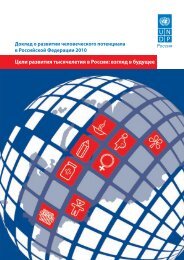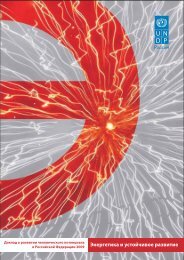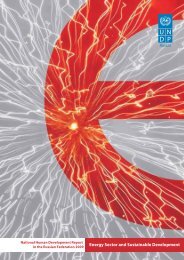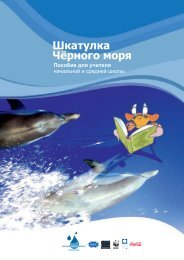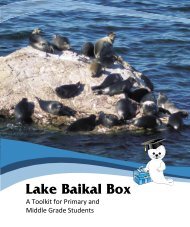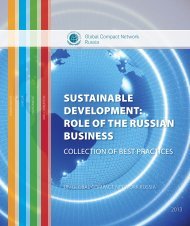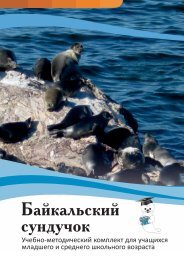Report - UNDP Russia
Report - UNDP Russia
Report - UNDP Russia
Create successful ePaper yourself
Turn your PDF publications into a flip-book with our unique Google optimized e-Paper software.
The 2009 National Human Development <strong>Report</strong> (NHDR) for the <strong>Russia</strong>n Federation has been preparedby a team of <strong>Russia</strong>n experts and consultants. The analysis and policy recommendations in this <strong>Report</strong>do not necessarily reflect the views of the UN systems and other institutions by which the experts andconsultants are employed.Chief Author:Prof. Sergey N. Bobylev, Dr.Sc. (Economics), Faculty ofEconomics at Lomonosov Moscow State UniversityAuthors:Leonid M. Grigoryev, PhD. (Economics), President,Institute for Energy and Finance; Chairman of the Board,WWF-<strong>Russia</strong>; Dean of Management, Moscow InternationalUniversityAlexander A. Kurdin, Expert, Economic Research,Department of Economics, Institute for Energy and FinanceChapter 1Natalia V. Zubarevich, Dr.Sc. (Geography), Professor,Department of Geography, Lomonosov Moscow StateUniversity; Head of Regional Programs, IndependentInstitute for Social PolicyChapter 2Isak D. Froumin, Dr.Sc. (Pedagogics), Lead EducationSpecialist, <strong>Russia</strong> Country Department, World Bank; Head ofResearch Institute for Education Reform, State University -Higher School of EconomicsDenis V. Nikolaev, MA in Education, Consultant inEducation Sector, Human Development Department, <strong>Russia</strong>Country Department, World BankEducation for Energy Sector (Box 3.1)Evgeny A. Zenyutich, Ph.D. (Engineering), Director,Research Institute of Energy Efficient Technologies, NizhnyNovgorod State Technical University; General Director,Nizhny Novgorod Investment Center of Energy EfficiencyProgramme of the Ministry of Education and Science of the<strong>Russia</strong>n Federation: Integrated Solutions for Saving Energyand Resources to Promote Innovative Development inVarious Sectors of the Economy (Box 5.1)Energy efficiency indicators used by the Federal EducationAgency (Box 8.2)Lilia N. Ovcharova, PhD. (Economics), Research Director,Independent Institute for Social Policy;Head of Laboratory of Distributive Relations, Institute ofSocial and Economic Studies of Population, <strong>Russia</strong>nAcademy of SciencesAlexandra Ya. Burdyak, MA (Economics), SeniorResearcher, Independent Institute for Social PolicyChapter 3Prof. Boris A. Revich, Dr.Sc. (Medicine), Professor, Head ofLaboratory, Institute of Forecasting, <strong>Russia</strong>n Academy ofSciencesChapter 4Igor A. Bashmakov, PhD. (Economics), Executive Director,Center for Energy Efficiency (CENEf)Chapter 5Igor S. Kozhukhovsky, PhD. (Economics), General Director,Energy Forecasting Agency (the EFA)Olga A. Novoselova, Head of Ecology and Energy EfficiencyProgram, Energy Forecasting Agency (the EFA)Chapter 6Victor I. Danilov-Danilyan, Dr.Sc. (Economics),Corresponding Member of the <strong>Russia</strong>n Academy ofSciences; Director, Institute of Water Problems, <strong>Russia</strong>nAcademy of SciencesChapter 7Prof. Sergey N. Bobylev, Dr.Sc. (Economics), Faculty ofEconomics at Lomonosov Moscow State UniversityChapter 8Box Contributors:Alexander A. Averchenkov, PhD (Economics), SeniorClimate Change Adviser, <strong>UNDP</strong>Correlation between climate change, the energy sector andhuman development (Box 1.1)Opportunities for use of carbon market instruments to raisepower efficiency of the <strong>Russia</strong>n economy (Box 5.2)Olga A. Murashko, Research Scientist, Institute for ResearchStudies and the Museum of Anthropology, LomonosovMoscow State University; Journal Editor, <strong>Russia</strong>n Associationof Indigenous Peoples of the NorthNative Minorities of the North and the Energy Sector(Box 2.2)Prof. Rafael V. Arutyunyan, Dr.Sc. (Physics andMathematics), First Deputy Director, Institute for SafeDevelopment of Atomic Power Engineering, <strong>Russia</strong>nAcademy of SciencesIrina L. Abalkina, PhD. (Economics), Senior Researcher,Laboratory of Systems Analysis, Institute for SafeDevelopment of Atomic Power Engineering, <strong>Russia</strong>nAcademy of SciencesNuclear Power Opportunities (Box 6.3)Victoria R. Bityukova, Ph.D. (Geography), AssociateProfessor, Geographic Department, Lomonosov MoscowState UniversityEnvironmental Sustainability of <strong>Russia</strong>’s UrbanDevelopment (Box 7.2)Alexander S. Martynov, PhD. (Biology), Director,Independent Ecological Rating AgencyPower Efficiency Rating of <strong>Russia</strong>’s Constituent Entities(Box 8.4)National Human Development <strong>Report</strong> 2009 for the <strong>Russia</strong>nFederation /Edited by Prof. Sergey Bobylev; editing in Englishby Ben W. Hooson/ Design and prepress and printing byLLC ‘Design-project ‘Samolet’. – M., 2010 – 166 pages, 45 tables,50 figures, 21 boxes.Readers are invited to inspect the latest Human Development<strong>Report</strong> for the <strong>Russia</strong>n Federation. National reports such as thisare published on the initiative of the United NationsDevelopment Programme (<strong>UNDP</strong>) in many countries of theworld. Global reports are also brought out annually. The reportsare compiled by teams of independent experts.The 13 th Human Development <strong>Report</strong> for the <strong>Russia</strong>n Federationassesses impact of the energy sector on the country’s economyand human development. The global economic crisis hasbrought many problems, but it also offers a window ofopportunity for <strong>Russia</strong> to transform its energy sector, whichevolved in its present form during the late 20 th century, into amodern, high-tech vanguard for the national economy in the21 st century, with due respect for the environment and humanhealth. Issues, which are the traditional subject matter of humandevelopment reports – economic development, income levels,employment, education and health care – are discussed in thecontext of the energy theme.The <strong>Report</strong> is intended for top managers, political scientists,scientific researchers, teachers and high school students.2 National Human Development <strong>Report</strong> in the <strong>Russia</strong>n Federation 2009



